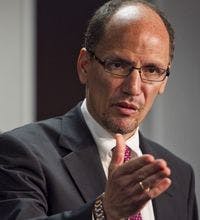By Howard Mavity
Yesterday (July 18), the U.S. Senate confirmed the new Secretary of Labor, Thomas Perez, and new EPA Director Gina McCarthy.
Along with two newly nominated Democrats who will be members of the National Labor Relations Board, the signs suggest that we may see an even more activist administration in labor, employment and safety matters.
New Secretary of Labor Perez is a former tough litigator and deal-maker from the Department of Justice’s Civil Rights Division. Based on his record, we seriously doubt that he will be as ineffectual as the previous Labor Secretary. Expect yet more support for OSHA‘s emphasis on whistle blowing claims, and for such claims in all Department of of Labor agencies.
New NLRB members will accelerate new policies
I also suspect that we may see more aggressive creation of policy through “interpretations” and an even heavier Federal involvement in State-OSHA plans. While much of the criticism leveled at EPA nominee McCarthy seemed directed more toward the EPA generally, some lawmakers thought Thomas Perez was too activist.
As discussed some in our recent Fisher & Phillips Labor Alert on the two new NLRB members, a 3-1 Board split will almost certainly accelerate the already swift issuance of new policies through decisions and guidance, which often alters or reverses dozens of years of legal precedence. For all of its aggressiveness under the Obama Administration, the NLRB has held on to some of its traditional reluctance to just slam things through,but one wonders if that even that reserve will survive.
As our Alert stated:
- The agency can be expected to continue down the path of increasingly regulating union and nonunion business alike by scrutinizing policies and procedures for any perceived encroachment on protected concerted activity.
- It also has the opportunity to reexamine and potentially reverse decades of long-standing precedent governing such items as representation rights in a nonunion setting, the voting eligibility of temporary employees, and the contractual obligations of successor employers.
- Last, but certainly not least, the Board could conceivably revisit its previously proposed “quickie election” rules, which had been temporarily enjoined due to procedural hurdles that have now arguably been overcome.”
No, the sky is not falling
One also cannot help but wonder the effect of pending mid-term elections and what some pundits term a near-total absence of leadership in D.C.
The sky is not falling. The above described trends are just that — existing trends.
- Will we see an acceleration of these trends in the Labor Department and at the NLRB? Probably.
- Will OSHA feel more empowered? Absolutely.
- Will the legislative gridlock improve. Not as it now stands.
- Will rule-making produce faster results? Depends on the calculus of the stakeholders and ensuing litigation. Rule making hasn’t worked well for either party in recent memory.
- Will union organizing pick up? Organizing would certainly increase if so called “quickie elections” become reality.
Bottom line? Stay alert. Expect more challenges under the whistleblower and protected concerted activity mantles. Scrutinize even more carefully your FLSA and OSHA compliance, especially any close calls which could become an issue under more expansive interpretation and enforcement.
Also look at OSHA’s recent focus in your industry. As to union organizing, do not focus on the unions, focus on developing the systems and culture that make unions unnecessary.
in other words, we all should keep our focus and do our jobs. It’s a great country. It’s probably going to be an interesting year or so …
This was originally published on Fisher & Phillips’ Workplace Safety and Health Law Blog.
